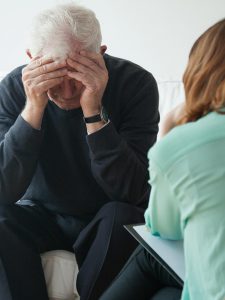We all felt a certain amount of anxiety when the COVID 19 pandemic started. So many unknowns were infiltrating our lives. What was going to happen next? What if… Now that we are in a less restricted phase of pandemic response, many people are still finding they continue to have higher degrees of anxiety than previously. This is not abnormal. Anxiety is an emotion created  when are bodies are in the nervous system state of activation, often referred to as ‘fight or flight.’ When we live in this nervous state we are essentially in survival mode. Between our physical reactions and our anxious thoughts, we can become very impacted by anxiety.
when are bodies are in the nervous system state of activation, often referred to as ‘fight or flight.’ When we live in this nervous state we are essentially in survival mode. Between our physical reactions and our anxious thoughts, we can become very impacted by anxiety.
Two primary skills I want to suggest to you today are:
1. Learn to talk back to the anxiety. We want to catch our anxious thoughts — like we are filtering them. When we identify them as anxious thoughts we have something specific we can address. We might even say, ‘that’s just my anxiety.’ After we’ve identified the anxious thoughts,  we actually want to challenge them or evaluate their content. “What am I telling myself right now?” “What do I know for sure? What are the facts?” The third step is to change the thoughts. If we continue to listen to the anxious thoughts without challenging them in anyway they will typically escalate and create more anxiety. This is not helpful or effective — often taking us farther into irrational fears or psychotic thinking. So three steps: stop/identify, assess/evaluate and change/replace. It’s almost like you are doing therapy on yourself.
we actually want to challenge them or evaluate their content. “What am I telling myself right now?” “What do I know for sure? What are the facts?” The third step is to change the thoughts. If we continue to listen to the anxious thoughts without challenging them in anyway they will typically escalate and create more anxiety. This is not helpful or effective — often taking us farther into irrational fears or psychotic thinking. So three steps: stop/identify, assess/evaluate and change/replace. It’s almost like you are doing therapy on yourself.
2. Learn to chill/relax. Become aware of your physical triggers or sensations that take place when your nervous system is in activation. What happens physically? This can include things like clammy hands, short shallow breathing, trembling, fidgeting, a rush of heat, sweating, clenching teeth/feet/hands, a nervous churning of the stomach, etc. Start to notice what happens to your body before you are aware that your thoughts are anxious. Then you can work to reduce the physical anxiety by directing your thinking and learning relaxation skills. This may include breathing more deeply and slowly, guiding your thoughts to something more helpful or calming, unclenching, shaking out your hands and feet, loosen muscle groups and other techniques. Reassuring yourself that you are not facing a real and present danger that would require you to fight or flight is also helpful.
Then you can work to reduce the physical anxiety by directing your thinking and learning relaxation skills. This may include breathing more deeply and slowly, guiding your thoughts to something more helpful or calming, unclenching, shaking out your hands and feet, loosen muscle groups and other techniques. Reassuring yourself that you are not facing a real and present danger that would require you to fight or flight is also helpful.
Anxiety can be managed and lessened. Do an inventory of your daily anxiety. Rate it from 1-10 and see if you can identify can specific triggers. If the thinking is largely driven by fear of the unknowns start to validate the unknowns that you are facing, and that you hate unknowns! Then shift your thinking over to focus on all the things you do know. If those unknown things become real THEN deal with them.
There are some great apps for anxiety management, including Mindshift CBT app (free). Mindshift CBT has several tools, tips and skills that are effective for managing anxiety. There are also some great books on anxiety like “Rewire Your Anxious Mind” by Catherine Pittman and ‘The Anxiety and Phobia Workbook” by Edmund Bourne. We also have some resources listed on our website: https://freshhope.ca/resources/




